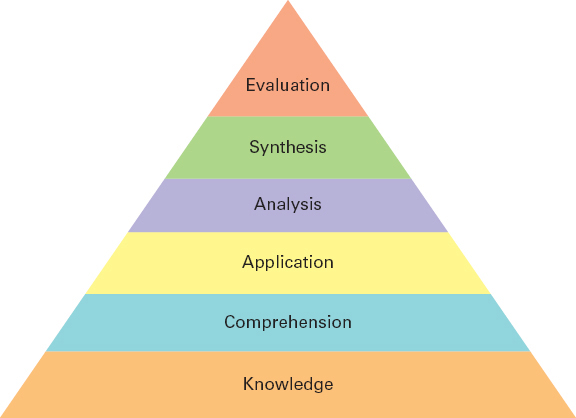ESSAY EXAMS IN GENERAL
ESSAY EXAMS IN GENERAL
When instructors have students take essay exams, they want students to engage in higher-level thinking. Multiple-choice and fill-in-the-blank questions are useful for assessing students’ understanding and memorization of facts. This is often important in college, especially in introductory classes. But you will eventually be required to do more than just show that you understood and retained information: You will be expected to apply, analyze, synthesize, and evaluate complex ideas. And that’s where essay tests come in.
A good way to understand what’s involved is to look at something called “Bloom’s Taxonomy.” This taxonomy, or classification system, divides knowing and thinking into six levels—a sort of pyramid with each level built on the previous ones. As you move up the pyramid, you find more complex thinking tasks. Let’s take a quick tour of the levels in Bloom’s Taxonomy, starting at the bottom.
Knowledge is the basic level. Questions at this level merely ask, “What do you already know about the topic?” They test your ability to recall facts.
Questions at the comprehension level ask, “Do you understand what you have recently learned?” That is, can you explain in your own words what you read for class or heard in a lecture? Both knowledge and comprehension are necessary for higher-level thinking.
Higher-level thinking begins with application. Questions at this level ask, “Can you apply what you have learned to a new context or situation?” If, for instance, you learned a formula for solving one math problem, can you apply that formula to solve another, similar math problem?

Analysis has many specific forms. But, essentially, an analysis question asks you to take a complex thing—for example, an article or a poem or a historical event—and break it down into parts so that you can better understand the whole. For instance, can you analyze the way an author structures an article so you see his or her main points in a better (deeper and more sophisticated) way?
Synthesis questions ask you to put things together into a new whole. Think about a musical synthesizer: It takes a bunch of different types of sounds and puts them all together to make a song. A synthesis question might ask you to take various articles on a topic and put them together, and then to use the result to come up with new ideas about that topic. Often you synthesize other people’s ideas to propose the best solution to a complicated problem.
Finally, we have the highest level of thinking: evaluation. An evaluation question might ask you to take a position and defend it with evidence from what you read.
Instructors often write questions that ask for a combination of these types of thinking, as you will see when we look at sample questions. Don’t spend any time trying to memorize the chart. The important point here is that essay exams ask you to do various types of thinking, especially the higher-level types of thinking. This knowledge about general expectations can be a good starting point for figuring out your instructor’s expectations for a specific essay exam.